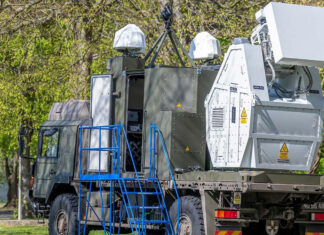

For five years and longer, the United States delayed reaching a decision regarding Taiwan’s repeated requests to buy new F-16C/D Fighting Falcons to replace its aging fleet of F-16A/B fighters in hopes of preventing the Chinese regime from closing the door on a wide-range of Sino-American issues of benefit to both nations. The US government has long feared that equipping Taiwan with a modernized force might lead to a prolonged breach in diplomatic discourse between the US and China, a situation the US would very much like to avoid.
After years of delay, Taiwan seems to be on track to procure the full US$5.2 billion upgrade package for its fleet of F-16A/B fighter jets as notified to the US Congress in September last year. Taipei may defer acquiring part of the package, worth about US$1.5 billion — but will eventually get the whole package as originally requested.
Today, China and Taiwan are basking in the warmth of the most promising relations the two nations have ever enjoyed. In 2005, China became Taiwan’s largest trading partner and cross-strait economic relations reached new heights with the signing of the China-Taiwan Economic Cooperation Framework Agreement (ECFA), a bilateral preferential trade agreement, in 2010. Although China represents Taiwan’s most lucrative trade partner, having displaced the United States for this title, Beijing has never given up on its political strategy to keep Taiwan from achieving international recognition as a sovereign nation. Beijing has also never repudiated its threat of using armed conflict to reunite Taiwan, a rogue province in Chinese eyes, with the remainder of the nation.
Taiwan has attempted, on four previous occasions since 2006, to deliver a Letter of Request (LoR) asking for pricing and availability of new F-16C/D Block 50/52 Falcons.
The four LoR’s were never actually delivered to the US government; all were withdrawn by Taiwan in response to US State Department pressure. Each time, the State Department argued that the timing of such a sale was not favorable in light of US desires not to disrupt improving Sino-US relations and noting that approval of such a sale could adversely impact any decisions on future arm’s sales.
In January 2010, the Obama administration approved a Taiwanese arm’s deal valued at $6.4 billion representing the second largest deal with Taiwan since the Bush administration agreed to sell Taiwan $6.6 billion in weaponry in 2008. The 2010 deal included 114 Patriot air-defense missiles valued at $3 billion, 60 UH-60 Black Hawk helicopters worth $3.1 billion, Harpoon anti-ship missiles, Osprey minehunters, ammunition, and communications equipment for Taiwan’s F-16A/B fleet.
China’s response to the 2010 weapon’s sale was swift and vehement. Chinese leaders filed a formal protest with the US and temporarily suspended US-China military-to-military cooperation.
In September 2011, the Obama administration ignored Taiwan’s request for 66 new F-16C/Ds and offered instead a sizeable upgrade package to modernize the island’s exiting fleet of F-16A/Bs purchased back in 1992. Rationale for this alternative was based on a desire not to antagonize the PRC and also not to demonstrate any public favoritism for Taiwan President Ma Ying-jeou who was then fighting for reelection.
The US upgrade offer, priced at $5.85 billion to modernize 145 F-16s, includes 176 Active Electronically Scanned Array (AESA) radar sets of unspecified manufacture, 128 Joint Helmet Mounted Cueing Systems (JHMCS) and Night Vision Goggle sets to support deployment of AIM-9X air-to-air missiles and precision guided air/ground munitions, integrated GPS Inertial Navigation Systems (GPS-INS), 140 AIM-9X Sidewinder missiles, enhancements for the APX-113 Advanced Identification Friend-or-Foe (IFF) transponders, targeting pods, precision guided munitions, and advanced upgrades to improve radar and thermal evasion capabilities.
The Obama administration has proposed the argument that the upgrade offer is in Taiwan’s best interest and would deliver more immediate benefits than the acquisition of new aircraft. Critics claimed that the administration’s offer was little more than a misguided attempt to placate the Chinese and limit the inherent risk of causing a rift in Sino-US relations.
As expected, China’s leaders publicly protested the upgrade offer, but have so far initiated no significant retaliation and appear disinclined to do so in the near term.
Taiwan’s hopes of getting new F-16C/D Block 50/52 aircraft instead of an upgrade for its older aircraft received an unexpected boost when a 27 April White House letter to US Republican Senator John Cornyn of Texas acknowledging deficiencies with Taiwan’s air fleet became public. This policy shift, outlined in a letter from Robert Nabors, Director of the Office of Legislative Affairs speaking on behalf of the administration, said the government was giving “serious consideration” to the situation in recognition of “the growing military threat to Taiwan.”
Although the letter did not make any specific promise to sell Taiwan the newer version F-16s, it did demonstrate that the Obama administration is giving the issue a second look. China’s expanding fleet of highly-capable front-line combat aircraft is likely one of the reasons the administration is revisiting the issue now. In his letter, Robert Nabors acknowledged that the White House was dedicated to “addressing the disparity in numbers of aircraft” between China and Taiwan noting that China had 2,300 combat aircraft in service compared to only 490 Taiwanese combat aircraft.
Senator Cornyn was blocking confirmation of Mark Lippert, President Obama’s choice for the position of Assistant Secretary of Defense for Asia, in retaliation for the administration’s position on the F-16 sale to Taiwan. The senator withdrew his opposition to Lippert’s appointment and he was confirmed on 26 April.
A US change in policy is also likely predicated on developments in Asia that may make the sale of new aircraft to Taiwan a much more palatable possibility. With China itself in the midst of an upcoming leadership change and suffering from some widely-reported national scandals, the Communist Party is in a vulnerable state of internal stress creating a greater than usual level of confusion among members of the ruling hierarchy.
An environment of uncertainty and internal struggle, a slowing economy, and a critical need to maintain good relations with the West are all likely to limit China’s disapproval and are less likely to result in any severe response from the nation’s leaders.
Disputes between Beijing and her neighbors, a rapidly growing Chinese military force, US plans to focus more attention on the Asia-Pacific region, and the need for the US to prove its commitment to its Pacific allies also offer the administration a level of support not enjoyed before.
In addition to all other considerations, the US House of Representatives included a provision in their version of the 2013 Defense Authorization bill that mandates the sale of 66 F-16C/D Block 50/52 jets to Taiwan. Although the US Congress has long been staunch in its support of Taiwan’s defense, some language in the Republican-sponsored House version of the Defense bill does not sit well with all members of the Senate and the F-16 mandate may not survive Congressional negotiations to finalize the bill.
Both the Senate and the House are advocating restoration of Defense Department budget cuts that President Obama has indicated would lead to a presidential veto. For now, only time will tell.
















